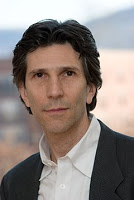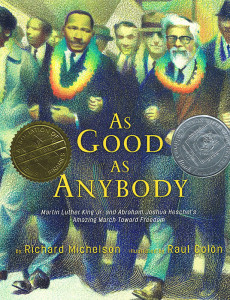I am thrilled and honored to welcome award-winning author, Richard Michelson, to my blog. His book, As Good As Anybody: Martin Luther King and Abraham Joshua Heschel’s Amazing March Toward Freedom (Knopf Books for Young Readers) illustrated by Raul Colón was awarded the Sydney Taylor Award Gold Medal. This eloquent book explores an important time in American history and the goodness of the people who came together for freedom. The beautifully written text of such a poignant, historic story is ageless and timeless. As Good As Anybody has the potential to educate, inspire, and bring communities together for the common good. It is an outstanding example of the power of books.
What was your inspiration for writing As Good as Anybody?
Inspiration, when it visits me, always seems to follow a very slow, pedestrian course. Well before I was writing children’s books I was exploring my childhood confusion concerning violence and racial issues, both in my poetry (Battles and Lullabies, U. of Illinois Press) and essays (a recent essay called Jews and Blacks can be read on the homepage of my site (www.RichardMichelson.com). When I was born, my area of East New York, Brooklyn, was 90-percent Jewish. Twelve years later, less than 10 percent of those living in the neighborhood were Jews. There was anger, bitterness–and friendship –on all sides. Much of my work is an attempt to both heal society’s racial wounds, and those within myself.
When I began to write children’s books I decided to fictionalize my old neighborhood at the 50/50 point. Across the Alley, (a 2006 National Jewish Book Award finalist and PJ Library selection) is about two boys, one Jewish and one black, who are not allowed to play together, but whose bedroom windows face each other’s. At night, when nobody is watching, they become secret best friends. It was while writing this story, that I remembered the friendship of King and Heschel, and I decided to examine another facet of a situation where social convention tries to keep people apart, but individuals attempt to overcome their differences.

Are there some interesting facts about the relationship between Reverend King and Rabbi Heschel that you did not include in the book?
Reverend King was killed on April 4th, 1968, just 9 days before Passover was to begin. King’s emphasis on the Jewish Exodus in his sermons formed the basis of a strong bond between both men and King and his family had planned to join the Heschel’s at their Seder. What a wonderful holiday celebration that might have been. I am sure it would have forged further alliances between the two men.

How much research was involved in this project?
Research is my favorite part of any project, though sometimes I suspect it becomes an avoidance mechanism. I had to tear myself away from reading books by and about King and Heschel, and force myself to begin writing. Coming into the project I knew more about King, so I primarily reread some of his speeches, to put his cadences back into my head. Like many secular raised Jews of my generation, what little I knew of Heschel, was centered on his anti-Vietnam stance, and that famous photo of him marching with King, which Raul Colon brilliantly interpreted for the book cover. I ended up reading Edward Kaplan’s biography of Heschel (and I was very pleased, months after publication, to run into Mr. Kaplan at a lecture by Susannah Heschel, Rabbi Heschel’s daughter and an accomplished scholar in her own right. The three of us had much to talk about and have kept in touch). I also read Or Rose’s YA bio, and Heschel’s essays Moral Grandeur and Spiritual Audacity, which I heartily recommend. It is an inspiring, sometimes difficult, always thought provoking book. And purely for my own enjoyment, I read Heschel’s poetry. Of course, I badly wanted to show off all my new “smarts,” so the most difficult part of the project was cutting out all that was extraneous to the core story.
What is your favorite holiday?
Hmmm. I am really not much of a holiday person, to my wife and children’s constant chagrin. One of my yearly pledges to myself is to slow down a bit and learn to enjoy a more leisurely holiday pace (spoken, I realize, as one who does not have to do the holiday cooking). Still, if I had to pick, I admit that, though I hate the long drive to and fro, I do look forward to Passover every year. I get to catch up with the cousins and I can’t resist my lovely wife’s potato-carrot kugel.
Richard, thanks so much for sharing your writing journey with us!
Richard loves to speak to groups. To learn more visit his website at http://www.richardmichelson.com/